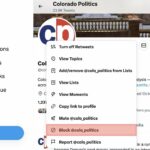Lawmakers seek counter to property tax spike, ability to block constituents on social media | WHAT YOU NEED TO KNOW

Today is May 2, 2023 and here is what you need to know:
Gov. Jared Polis on Monday unveiled a much-anticipated proposal to offer tax relief to Coloradans, a key provision of which is to ask voters to fix the problem via the ballot box this November.
The proposal seeks to do three things: Provide immediate property tax relief, address the problems that arose from the voter-approved repeal of the Gallagher Amendment in 2020, and provide a mechanism to prevent property tax rates from increasing faster than income, tied to the Denver-Boulder Consumer Price Index.
The move comes as the Colorado lawmakers stare down the barrel of looming crisis, one in which property taxes are expected to increase this year by as much as 50% for many homeowners.
Flanked by Democratic lawmakers, business owners, homeowners and other supporters, Polis said the proposal will reduce residential property tax increases by 50% on average.
Critics immediately called the proposal insufficient – akin to bringing a “squirt gun” to a burning building. Proponents said the multipronged approach offers tangible relief.
Courts throughout the country have deliberated for years on whether elected officials have the right to block their constituents on social media. Now, Colorado lawmakers are trying to take the decision into their own hands.
If made law, House Bill 1306 would give all elected officials in the state the power to block someone from viewing or interacting with the official’s social media pages – for any reason. This would apply to their personal social media accounts, even if they use them for official business, but not accounts attached to a specific political office.
The bill passed the House in a 43-20 vote on Monday and is now being sent to the Senate for consideration.
Gov. Jared Polis on Monday signed the main bill that puts into place the spending plan for Colorado’s state government for the 2023-24 fiscal year.
The budget, at $38.5 billion, is the largest in history and about $1.2 billion more than the current year’s spending plan.
Most of the increase, about $822 million, is for the Colorado Department of Health Care Policy and Financing and intended to cover the expiration of enhanced federal Medicaid matching funds tied to COVID-19 emergency declarations.
Surrounded by all six Joint Budget Committee members, the first time since 2018, the governor called the budget prudent and fiscally responsible. He noted its record investment in K-12 education and its first-time funding for universal pre-kindergarten education for 25,000 families.
The budget also includes investments in water that the governor said will draw down tens of millions in federal dollars that will support water projects, as well as the state water plan.
More than 350 students so far this school year have had a threat assessment, at least 42 of whom across Denver Public Schools (DPS) required a pat down the week an East High School student shot two administrators five weeks ago.
There are approximately 89,200 students in the district.
A threat assessment is in response to a behavior and can lead to a student being placed on a safety plan, similar to one 17-year-old Austin Lyle was under. Police accuse Lyle of shooting two East High School administrators who patted him down for weapons on March 22.
Treasury Secretary Janet Yellen notified Congress on Monday that the U.S. could default on its debt as early as June 1, if legislators do not raise or suspend the nation’s borrowing authority before then and avert what could potentially become a global financial crisis.
In a letter to House and Senate leaders, Yellen urged congressional leaders “to protect the full faith and credit of the United States by acting as soon as possible” to address the $31.4 trillion limit on its legal borrowing authority. She added that it is impossible to predict with certainty the exact date of when the U.S. will run out of cash.
“We have learned from past debt limit impasses that waiting until the last minute to suspend or increase the debt limit can cause serious harm to business and consumer confidence, raise short-term borrowing costs for taxpayers, and negatively impact the credit rating of the United States,” Yellen said in the letter.














